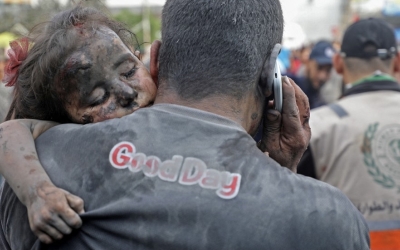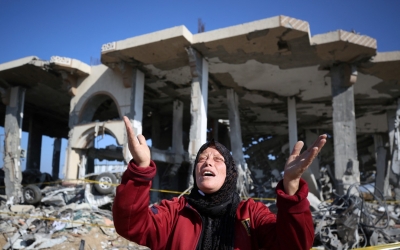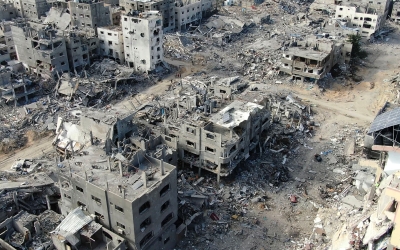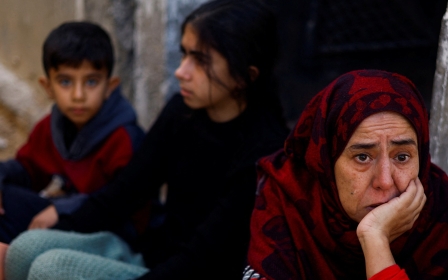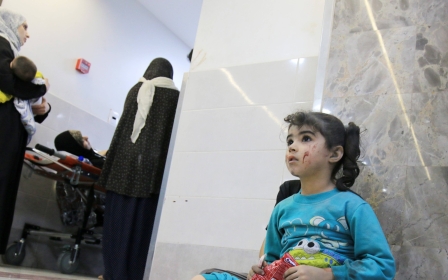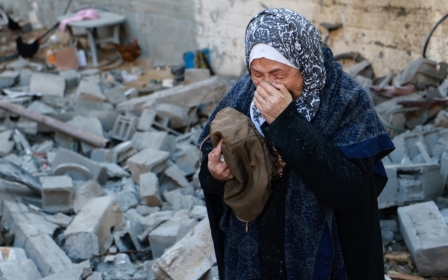War on Gaza: Our houses are built from our stories, not stones
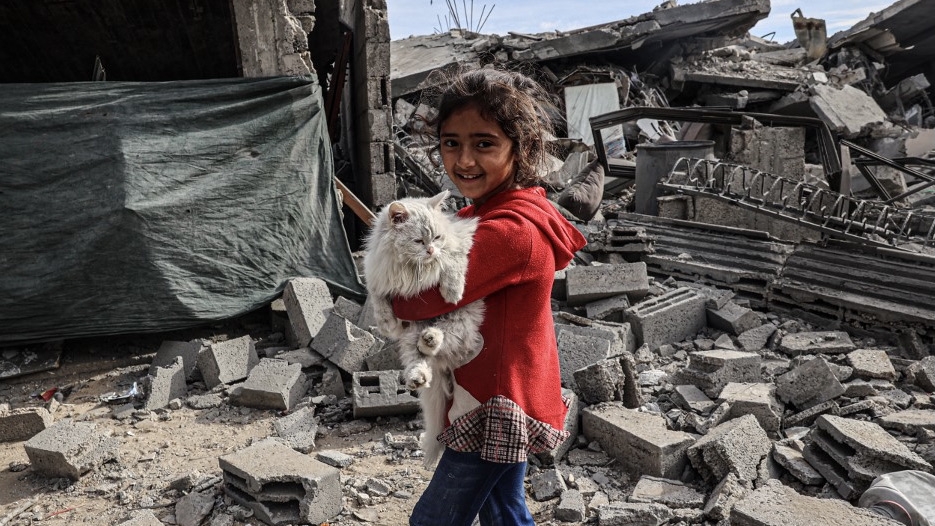
On a bitterly cold night in Dublin last month, I was heading to a cultural event to watch a film about Palestine, showcasing our suffering under the Israeli occupation.
I must confess, I was hesitant to attend. Being from Gaza, I felt I had already lived through the narrative - endless wars, an experienced survivor with unyielding scars. Yet, something drew me there.
Last September, I left Gaza - the world's largest open-air prison - for Dublin to pursue studies. Though physically free, the psychological chains remained.
Only days before, an Israeli raid had killed my uncle, Imad Jouda, a UN employee, while he was sleeping in his new house. My two-year-old niece, Yafa, would cry out of fear and hunger, her father unable to find milk or suitable food.
Our house, in which my mother had invested all her life savings, was rendered uninhabitable by Israeli raids.
New MEE newsletter: Jerusalem Dispatch
Sign up to get the latest insights and analysis on Israel-Palestine, alongside Turkey Unpacked and other MEE newsletters
Minutes before the film, my younger brother, Momen, sent me a message saying they had survived a massacre by a miracle and asking me to stay calm if I read the news.
"Is there a greater hell than this?" I asked my Irish friend, who was reassuring me.
Building our haven
My father, Ramzi, succumbed to cancer in 1999, leaving my mother, Somaia, to raise four children alone.
Simsim (as we call our mother) was just 33 when she embraced him one final time before laying him to rest. She softly shared with him, in a heartfelt whisper, her commitment to remain unmarried and devoted solely to him.
Shortly after, she took up a full-time job as an Arabic teacher to support us. In 2005, when Israeli forces withdrew from Gaza, Simsim started building a house, brick by brick. The dream was soon hampered by the suffocating Israeli siege on Gaza in 2006, inflating the cost of construction materials.
As Simsim was the sole breadwinner, she had to take loans and got into a lot of debt.
Finally, in October 2008, we moved into our haven, each of us with a room, a ground floor for gatherings and endless barbecues.
Only two months later, I was taking a maths exam at my middle school in Deir al-Balah camp, in the middle of the Gaza Strip, when deafening bombings shook the school. As a 13-year-old, it was the first time I had heard such a terrifying sound. I thought the Day of Judgment was unfolding, but it was the declaration of the first Israeli war on Gaza.
The teachers asked us to rush to the bus. While on my way home, I saw hundreds of people dead in the streets: a shocking scene and something I had never seen before. At midnight the next day, 28 December, the Israeli army called our adjoining neighbour, ordering him to evacuate his house before bombing it.
He started shouting and calling all the neighbours to evacuate. We woke up scared and trembling. We grabbed light clothes and fled with our neighbours, children, women and elderly people alike.
The sound of Israeli warplanes forced us to lie down beneath a wall. Moments later, they unleashed two missiles. The earth was trembling, with heavy suffocating smoke in the air. It was raining shrapnel and stones.
The earth was trembling, with heavy suffocating smoke in the air. It was raining shrapnel and stones
Shortly later, we ran again, under the sound of Israeli spy drones, until we reached my grandfather's house, a 15-minute walk away.
My grandfather, Ali, who was forcibly expelled barefoot by an armed Zionist militia in 1948, leaving all his belongings behind, asked me to sleep next to him.
Covering me with his blanket, he told me: "I was an orphan, almost your age when I had to leave my home behind and when I saw hundreds of people murdered by the Zionists. Don't worry, habibi [my dear], everything will be okay."
How ironic it is to share the same destiny with my grandfather, finding solace under the same blanket, and suffering from the same occupation despite the time difference of more than 60 years.
Bitter displacement
The next morning, we went back to check our home, but we found only rubble. My mother fainted immediately. My uncle, who is a nurse, revived her and we headed to his house, a 10-minute drive away.
I was only 13. I asked my grandfather the same question all Palestinian children ask today: why the hell should I go through all this?
"It's the occupation, habibi," he said in a suffocating tone. But I did not understand.
However, after 15 years, I have found the long-awaited answer: "Israel has the right to defend itself from Palestinian children and women and bomb civilian buildings whenever it wants. No matter how many will be killed."
The more I read the statements of the UN, the US and many western countries, the more the answer is "convincing".
After the war, we endured two years of bitter displacement. The government compensation we received fell far short of what was needed to rebuild our home.
With more debts and loans, two gruelling years my mother tirelessly built our haven again: two furnished stories, with each of us having our own room. Moving into our new home felt like a bittersweet victory, tinged with the memories of our past struggles.
But joy in Gaza is fragile. When Israel launched its second war on Gaza in 2012, we evacuated our house to avoid repeating our previous fate. During the eight days of the war, we were scared to death about our house.
However, on the last day, the ceasefire was announced to come into effect at night. The news of a ceasefire filled us with hope, only to be shattered in the last hour as bombs rained down once more and flattened our house hours before the ceasefire.
The devastation was absolute, the heartbreak etched onto our souls. The most agonising moment came when everyone else returned home, yet those who lost their loved ones and houses remained displaced.
Cherished memories
I remember my mother, overwhelmed, barely speaking or eating for days. Her only solace, her anchor, was faith in God. "Alhamdulillah! May God let them go through what they did to us!" she used to say repeatedly.
Again, it took us two years to rebuild the house, with more loans and debts. My mother was still the only breadwinner for us, and so bore the weight of additional loans and debts accumulated from the first house.
I remember my mother, overwhelmed, barely speaking or eating for days. Her only solace, her anchor, was faith in God
After a few years, we graduated from universities and started working. Like the vast majority in Gaza, we were underpaid but we also were considered lucky to find jobs as the unemployment rate was more than 50 percent.
Thankfully, we managed to settle our debts gradually and adorn our home. The small garden became my haven, a place to relax and work. My mother cherished spending time there, enjoying the oranges and her Turkish coffee.
Whenever she was upset, I knew the magic formula - a delicious cup of coffee and a seat in the garden beside the fragrant mint plants. It was my key to calming her down and mending any disagreement.
In 2022, joy arrived with the birth of Yafa, my niece, named after my grandfather's beloved city, Jaffa, from where he was forcibly expelled in 1948, along with 750,000 Palestinians by armed Zionists.
Sadly, he passed away in 2010, on the 62nd anniversary of the Nakba. I wished he could have seen our unwavering loyalty to Jaffa, just as my mother had shown to my father.
Steadfast in our cause
When the ongoing genocidal war on Gaza erupted on 7 October, my family evacuated our house immediately. Displaced multiple times from one place to another, my family finally found shelter in a tent in Rafah, having survived three massacres.
Again, for the third time, the Israeli army bombed our neighbour's house two months ago, killing 10 of them and making our house uninhabitable once more. That came after my two brothers had lost their jobs.
Simsim collapsed but she clung to the solace of our survival, regardless of the inhuman conditions my family is forced to live in.
Just when we thought the worst had passed, the Israeli army stationed in our neighbourhood invaded our house, destroying Simsim's flat that was already damaged, and writing in lipstick on the mirror that had survived in our house: "The people of Israel are alive."
Yet, as Simsim has taught us, we have but one choice: to remain loyal to and steadfast in our cause, as she remained devoted and loyal to my father, and to rebuild our home once more.
While the film was interesting for foreigners, I was right: it did not offer anything new to me. Nor would it have for most Palestinians, experienced survivors who have been suffering from the longest, most brutal occupation in modern history.
The views expressed in this article belong to the author and do not necessarily reflect the editorial policy of Middle East Eye.
Middle East Eye delivers independent and unrivalled coverage and analysis of the Middle East, North Africa and beyond. To learn more about republishing this content and the associated fees, please fill out this form. More about MEE can be found here.



